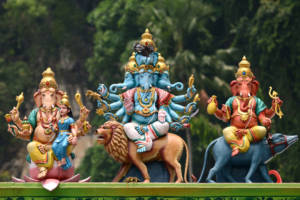Which God Reigns Supreme? In Hinduism, There Are No Clear Answers

The number of Canadian practitioners of Hinduism has increased significantly in recent years, but misconceptions remain about this ancient set of beliefs.
The population of Canadians that practice Hinduism has grown significantly over the last several years. Statistics Canada’s figures from the 2011 National Household Survey reveal that over 497,000 live in the country, an increase from the 297,000 indicated on the 2001 census. Yet even as the country’s community of believers grows, Canadians with a Western and Christian understanding of religion may misconstrue many Hindu spiritual practices. It’s impossible to comprehensively discuss these belief systems in such a short space, but a basic overview can provide a better understanding of this old and expansive group of beliefs.
One God, Many Gods, or a Single Divine Principle?
Contemporary scholars attempt to classify religions based on their ideas about the nature of the divine. Generally, most spiritual traditions fall into one of several categories:
- Polytheistic, supporting a belief in many gods
- Monotheistic, believing in only one god
- Atheistic, rejecting the notion that any gods exist
- Agnostic, proposing that it’s impossible to know if anything spiritual exists beyond our material world
- Pantheistic, suggesting that the universe itself is God
- Henotheistic, devoted exclusively to venerating one deity while acknowledging the existence of others
- Panentheistic, proposing that God both is and exists beyond the universe
To outsiders, Hinduism may appear to be a polytheistic religion. In truth, it is difficult to classify because of its huge variety of philosophical and theological traditions spanning all these categories. The Canadian Encyclopedia further clarifies that many believe in a universal spirit referred to as “Brahman.” This spirit is usually regarded as the supreme principle that either causes all of existence, serves as the fundamental essence of our universe, or both.
The Mahabharata, a Sanskrit epic penned sometime between the ninth and fourth centuries B.C.E., claims that this universal spirit exists in three forms. A portion of the text exclaims, “In the form of Brahma, he is the Creator, and in the form of Vishnu he is the Preserver, and in his form as Rudra [Shiva], he is the Destroyer of the Universe!” These three divine essences are collectively called the Trimurti and are sometimes worshipped together in this form. At the same time, others view the various deities in Hinduism as simply different faces of the ultimate universal spirit.
Major Deity-Focused Denominations
BBC Religions explains that some argue for Hinduism to be classified as a “family” of religions rather than a single faith, thanks to its numerous religious texts and wide range of ideas. Although it’s difficult to ascertain its exact number of denominations, several significant schools of thought have been identified. For example, followers of Vaishnavism believe that Vishnu is the “Svayam Bhagavan,” or Supreme Lord of the universe, while Shaivists regard Shiva as the supreme deity. Meanwhile, proponents of Shaktism devote themselves to venerating goddesses and a divine feminine principle that exists alongside its masculine counterpart. Smartism treats all deities the same and generally involves the worship of five core deities that serve as a collective manifestation of Brahman. This group of divine entities usually includes Vishnu, Shiva, a major goddess such as Devi or Parvati, the sun god Surya, and a fifth deity chosen by the devotee.
A Modern Family of Faiths That Defy Classification
Contemporary Hinduism is anything but a simple belief system with a uniform set of ideologies. Rather, it could best be described as a fascinating family of faiths with interrelated practices. Many of its philosophies originated during the Indus Valley Civilization that existed thousands of years ago, but further synthesis with Vedic religious ideas from later Indo-Aryan cultures may have occurred. From different ideas about the nature of the universe to diverse divinity-focused traditions, modern Hindus follow a huge array of spiritual practices.

